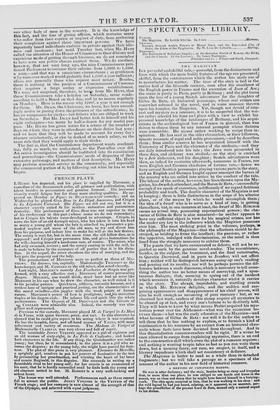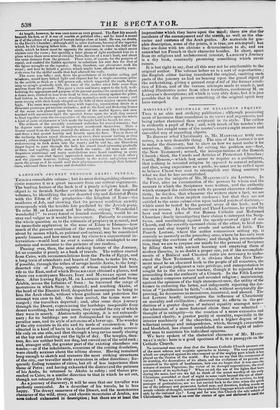THE MAGICIAN
Is a powerful and skilful tale,—powerful, from the distinctness and force with which the mere bodily features of the age are presented; skilful, from the contrivances which the author has made use of to manufacture his matter. The time of the story is laid in the earlier half of the fifteenth century, soon after the overthrow of the English power in France and the execution of Joan of Arc; the scene is partly in Paris, partly in Brittany ' • and the plot turns upon the love of a young Scotch adventurer for the daughter of
Gilles de Retz, an historical personage, whose real crimes are somewhat softened in the novel, and in some measure thrown upon his tempter, the Magician. Yet, though not devoid of inte- rest and mystery as a romance, it is to be suspected that the wri- ter rather selected his time and place with a view to exhibit his personal knowledge of the landscapes of Brittany, and his acqui- sitions in the archmological lore of France in general, than was driven to choose them by any internal prompter whose dictates were irresistible. He seems rather working by recipe than in- spiration. He has read in the older chroniclers, or their followers, minute accounts of regal and noble processions,—and lie describes them ; from similar sources lie has acquainted himself with the University of Paris and the character of the students,—and they
are duly introduced into his tale ; the Jews were persecuted in those days, and alchemy was studied,—so the story is enriched
by a Jew alchemist, and his daughter ; Scotch adventurers were then, as indeed for centuries afterwards, numerous in France, nor were English and German chieftains of fortune rare,—hence we have several Scottish personages playing various parts in the story, and an English and German knight appear amongst the barons of the country who are called into action by the conduct of the tale. The labour of the author, however, has been thrown upon the Ma- gician, his dwarfish attendant, and the Baron de Retz,—successfully enough if we speak of execution, indifferently if we regard fictitious probability and truth. The double character of the Magician is not in keeping ; there is little distinctness in the scope of his ulterior plans, or of the means by which lie would accomplish them ; the idea of a dwarf who is to serve as a kind of imp, is getting threadbare, but, in one instance at least, the dwarf of Mr. RITCHIE seems an actual imp, possessing supernatural powers ; the cba- lacier of Gilles de Retz is also unnatural—he neither appears to have any sufficient object in view for his magical crimes, nor has the reader any key to the influence which the Magician possesses over him. The most striking point in the volumes, perhaps, is- the philosophy of the Magician—that the affections should be de- stroyed, as tending to fetter the intellect; the passions, or rather the appetites, indulged with discrimination, as the mind is thus freed from the struggle necessary to subdue them. The points that we have enumerated as defects, will not be re- garded as such by the genuine novel-reader. The resemblance, besides, in the subject, the treatment, and the final catastrophe, to Quentin Durward, and in parts to Ivanhoe, will not affect him ; neither will he distinguish between using-up one's reading and pouring out its results; nor will he perhaps perceive the dif- ference between a made discourse, which is necessary to tell some- thing the author has no better means of conveying, and a spon- taneous dialogue, that, seeming to spring out of the incident. which occasions it, naturally develops character whilst it carries on the story. The abrupt, improbable, and startling events- in which Mr. RITCHIE delights, and the sudden and sur- prising appearances and disappearances of his chief person, will also be well enough as savouring of pure romance : but, as we observed last week, readers of this stamp require all mysteries to- be cleared up at last, and every one's fortune to be distinctly told. They will burn to know by what means Prelati acquired his mys- terious power over the Alchemist—what was the connexion be- tween them—what was the early education of the Magician—and what became of Gilles de Retz : nor will it do for the author to tell them that he has nothing to explain, or to furnish a kind of continuation to his romance by an extract from an historical chro- nicle whose facts have been deviated from throughout. And in this dissatisfaction romance-readers will be right. It' a writer be once allowed to escape from explaining mysteries, there is an end to the constructive skill which even the plot of a romance requires; and nothing is wanting to spin tales as fast as pen can write them down, but a teeming fancy, not rare, we suspect, in itself, and a literary impudence which shall set consistency at defiance. The Magician is better to read as a whole than in detached fragments; but we will take a passage as a specimen of the manner of the author in his new field of historical romance.
MEETING OF CONSPIRING BARONS.
He was in utter darkness; and the stair, besides being so steep and irregular that, in more than one place, he WAS obliged to use hands and knees in the ascent, was so close and damp that he might have fancied himself in a burying- vault. The idea again occurred to him, that he was walking in his sleep : and the wild legend he hail just heard, relating, as it appeared, to an ancestor, per- haps the grandfather of the present Lord de lieu, seemed only a natural sequel to his dream. At length, however, be was once more on even ground. The tiOof felt smooth beneath his feet, as if it was of marble or polished tiles; and he heard leound as if of the silence of a group of human beings close at hand. He was, no doubt, in the Devil's Chamber ; although still in utter datkuess, because of the tapestry which he felt hanging before him. He did not venture to touch the fold of the cloth, which he knew must be opposite the staircase, in order to admit secret visiters into the room ; but speedily a faint gleam of light conducted him to a place where there were several circular holes, the size of a man's head, and about the same distance from the ground. These were, of course, for the purpose of espial, and enabled the hidden spectator to substitute his own face tor that of the figure wrought on the tapestry. Here, therefore, our adventurer took his stand ; and here he beheld a picture which might have afforded worthy mate- liaiS even for the skilful needle that had adorned the walls.
The room was lofty ; and, from the gracefulness of its Gothic ceiling and writedown, would have looked light and elegant but for a single enormous pillar in the middle as thick as a full-grown oak, which supported the vault, begin- ning to mingle gradually with the nave of the arches when little more than midway from the ground. This gave a stern and heavy aspect to the hall, well. befitting the appearance and purpose of its present guests,who consisted of about a dozen men, clothed in iron from head to foot, tome leaning against the pillar, half hidden in its shadow ; some standing motionless with crossed arms; and 4orne resting with their hands clasped on the hilts of their mighty swords breast high. The room was completely hung with tapestry, representing devils in a thousand grotesque yet terrible attitudes; and as the laird and flickering beams of the moon now glanced upon the armour of the mailed figures, and now touched with niyaterious light the spectral forms upon the wall, they seemed to bind together even the incongruities of the scene, and confer upon the whole a kind of unity of character which made the knight hold his breath for awe.
The stillness of the assembly continued unbroken for seveial minutes ; but by degrees some symptoms of impatience manifested themselves. Here a hoarse sound fl om the throat startled the silence of the room like a blasphemy, and there a foot grated harshly and heavily upon the floor. Two or three of the reclining figures raised themselves up erect, their armour rattling as they moved ; others stepped lightly, and, as it were, cautiously towards the window, endeavouring to look down into the court; and by and by, one herculean figure began to pace through the hall, his armed tread increasing gradually in force and rapidity, till the noise shook the vaults. All were now astir. Impatient Mutterings and angry maledictions were heard rumbling in every .casque ; the iron-clad figures approached nearer and nearer to each other ; .and the gigantic warrior, halting suddenly in the midst, and glaring round .upon the group as if he would read their !physiognomies through their helmet- +burs, addiessed them in a fierce aud disdainful voice.



























 Previous page
Previous page